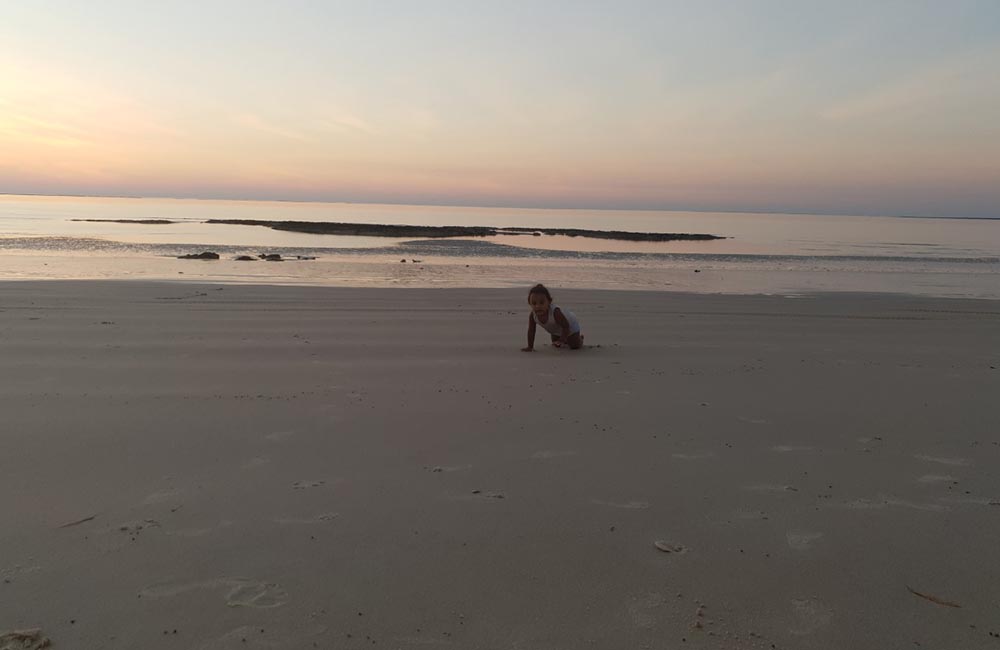‘My connection to culture makes me who I am.’
In the lead up to NAIDOC week, we spoke with Miriuwung Gajerrong and Bardi woman, Mary Baird about ancient connections and moving forward together.
The red dirt road heading north from Broome is the only way to reach the Dampier Peninsula on wheels. This is Bardi and Jawi country, where it’s all about the beach and the bush, and the timeless secrets and stories they keep.
The spirit of ancestry is strong among the Dampier communities; knowing who you are and why you belong. Mary Baird, Team Leader for Save the Children’s early learning and family support programs in the region, believes this is an important connection to pass on.
“I think it’s very important because it’s what makes me. It’s what makes who I am as an individual. It’s what makes me proud just to be who I am. I think without my people, my ancestry, my culture – I don’t really know what life would look like if I didn’t have that.”
Equally significant to locals throughout the Kimberly is connection to country. This is something that can be hard to define and can mean different things to different people. For Mary, it’s about a sense of belonging.

“You know your country when you see it,” she says. “You know your home because you feel it. You feel good when you come back home. And you know that’s where you’re meant to be. That connection is very strong up here in these communities.”
A fine balance
Save the Children works with local communities on the Peninsula to help make sure the youngsters get every opportunity at a good start in life. A family centre provides a safe and supportive space for kids to learn and play – building self-confidence, learning to eat well, exercising and developing important social skills.
This remote part of Australia presents a mix of challenges and rich rewards for the children and families who live here. As Mary knows, there’s a fine balance between adapting to the convenience of the modern world and maintaining a bond with traditional culture.
“One way we find balance is by bringing in our elders to tell stories,” she explains. “Sure, we can have the books and the television and the kids can learn from that. But it’s important to make time for outdoor play – a chance to get back to nature by taking away the technology and the TV and the YouTube… We always make sure we have a beach day or bush walk or fishing trip in our school holiday programs.”
No place like home
While the Dampier Peninsula is about as far from any major city as anywhere in the world, Mary couldn’t imagine anywhere better for her young daughter to grow up.
Deserted beaches, endless bush, wildlife and an abundance of fresh seafood. “We’ve got our own supermarket in the ocean, it’s so good!”
Mary can see the same sense of belonging emerging in her daughter. There’s no feeling of missing out, but rather a healthy respect for what they have.
“We don’t have everything, therefore you can teach them to be grateful for the things you do have. People in towns and cities just don’t have access to the beaches and bush like she does. So it’s about being grateful, too. And helping instil that connection.”
Voice. Treaty. Truth.
The theme for NAIDOC Week 2019 is ‘Voice. Treaty. Truth. Let’s work together for a shared future’. It speaks to three key elements of the reforms set out in the Uluru Statement from the Heart. It also seeks a recognition and acknowledgement of the unique place that Aboriginal and Torres Strait Islander culture occupies in Australian history.
The theme’s reference to Voice is about being heard. It’s about being included in the conversation and contributing to the decisions that will help us move forward together. And Mary Baird believes that voice is getting stronger.
“I think we’re definitely being heard now more than we did in the past,” she says. “I think there was a handful of significant events that brought change – with Vincent Lingiari and Eddie Mabo and moments like that – and I think people are finding their strength in one another. Our mob, we’re uniting – to become one voice and to be heard.”
Images: Save the Children